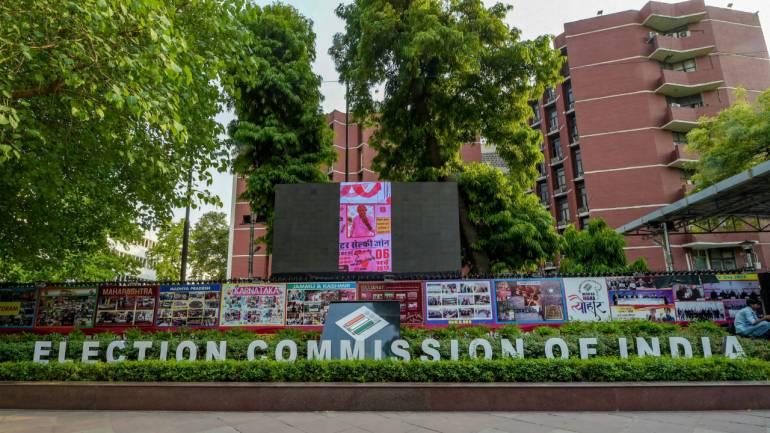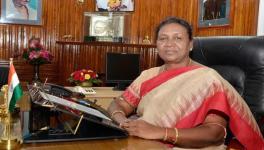Election Commission Failed to Curb Fake News Online Before 2019 Lok Sabha Polls

Image Courtesy: Money Control
In the run-up to the 2019 general elections, a committee set up by the Election Commission of India (ECI) had examined the critical gaps in the regulation of political campaigning. The panel looked at the provisions in Section 126 of the Representation of the People (RP) Act, 1951 – which defines a “silence period” starting 48 hours prior to the conclusion of polling in any particular area, during which all political campaigning is supposed to cease. The committee was supposed to identify lacunae and suggest amendments to the law to improve its effectiveness. In particular, the committee was tasked to examine the issues raised by the proliferation of political propaganda on social media platforms, and to work towards developing a regulatory framework.
The committee, set up by the ECI in January 2018, comprised several officials of the commission itself, together with representatives of the ministries of Information & Broadcasting, Law & Justice, and Electronics & Information Technology. Also, in the panel were representatives of the quasi-judicial Press Council of India (PCI) and the self-regulatory organisation of private television news channels, the News Broadcasters Association (NBA).
During the consultation process, over a series of meetings that took place through 2018, the committee invited the views of the country’s national and state political parties, the Internet and Mobile Association of India (IAMAI) and social media companies: Facebook, WhatsApp, Twitter, and Google. Its report was submitted to the ECI in January 2019. But the contents of this report were not known till July 12 after it was obtained through a right to information (RTI) application by Srinivas Kodali, an independent researcher and analyst based in Hyderabad, who then made it public.
Curiously, while Kodali was able to obtain the report via his application, another RTI application made on 25 February by an activist named Aditya Kalra (that was reviewed by these authors) seeking a copy of the same report was denied by the ECI on May 20, three days before the results of the elections were announced. The reason why the ECI denied Kalra the report was that the third parties involved in the consultations, namely, the social media companies, were not in favour of disclosing the report on grounds of “confidentiality.”
Too Little, Too Late
On March 5, 2019, the election dates were announced and the Model Code of Conduct (MCC) came into effect. A fortnight later, on March 19, the ECI called a meeting of representatives of social media and other online “intermediary” companies, following which, the commission issued a set of guidelines for social networks and updated an application for citizens to report violations of the MCC. A day later, on March 20, the IAMAI put out a “voluntary code of ethics” that was intended to “safeguard [social media platforms] against misuse to vitiate the free and fair character of the 2019 general elections.”
The newly released ECI committee’s report makes it clear that the IAMAI’s code of ethics was derived entirely from the recommendations made by the committee and was essentially a list of measures suggested by the IAMAI itself to the committee. As we shall see, the committee was functioning during a period that had witnessed high-profile battles among different stakeholders in the internet space over proposed changes to the Indian law on online intermediaries.
It can, hence, be argued that in the absence of a clear legal framework and being caught in the middle of a highly polarised debate, the ECI committee had a very few options before it in its attempts to put in place a stronger enforcement structure for online news relating to the election campaign. It had bitten off far more than it could chew. A statement released by a group of civil society activists and retired civil servants soon after the code of ethics was issued, raised a number of questions on the process followed by the ECI.
Also read: EC Refuses to Share Details on Model Code Violations by PM, Others
Over and above the issues relating to online communications, a significant recommendation of the committee related to amending Section 126 of the RP Act to include the print medium within the ambit of the prohibited media that could be used for campaigning during the 48-hour silence period. In order to implement this recommendation, the law would have to be amended. This suggestion was favoured by representatives of all political parties consulted by the ECI committee barring one, and that was the Bharatiya Janata Party (BJP).
Committee’s Proceedings
The “task of the committee,” according to the report, was to “initiate a multi-stakeholder engagement process to take stock of the critical gaps in the extant Section 126 of the Representation of People Act, 1951” and “examine the challenges in its implementation and enforcement and suggest suitable measures”. Headed by Senior Deputy Election Commissioner Umesh Sinha, the committee included eight other officials of the ECI along with nominated members from the various ministries listed earlier besides representatives of the PCI and the NBA. Other stakeholders were special invitees.
In its initial discussion, the committee examined Section 126 of the Representation of the People Act, which, in its initial form in the 1951 Act, prohibited the convening, holding or attending, joining or addressing any public meeting or procession in connection with an election during the period of 48 hours prior to the close of polling. This section was amended in 1996 to include prohibition of display of election matter by means of television, cinematograph or similar apparatus.
The committee noted that more than two decades after the 1996 amendment, advancement in communication technologies had raised issues in the context of the implementation of Section 126, particularly due to the presence of 24x7 news channels beamed nationwide using cable and direct to home (DTH) satellite technology, and the ubiquitous presence of online social media platforms or “intermediaries.” The panel first examined comparable “silence periods” in different election systems across the world and how various attempts had been made to tackle the unique challenges posed by online media.
The committee identified three areas where there are frequent violations of election rules – television coverage including live coverage of political events and interviews of political leaders by broadcasters during the silence periods, the “systematic and organised” use of social media platforms by political actors to “manipulate and deceive the voting public, and undermine electoral verdicts,” and the anomaly in Section 126 introduced by the 1996 amendment, whereby campaign prohibitions during the silence period extended only to electronic media and did not include the print medium. The committee’s view was that all media should be treated as covered by Section 126, and towards achieving this end, it suggested that the law be amended to include print media, and a framework devised to govern social media platforms or online “intermediaries.”
In this context, the committee examined guidelines on “norms of journalistic conduct” issued by the PCI, comparable “guidelines for election broadcasts” issued by the NBA, and the 255th report of the Law Commission of India on electoral reforms that had recommended that the print medium be added to Section 126 of the RP Act, and the terms “television, cinematograph or similar apparatus” be replaced by “electronic media” – that would be taken to mean internet, radio and television including internet protocol (IP) television, satellite, terrestrial or cable channels, mobile and other such media”.
Responsibilities of Intermediaries
At this stage itself, the contours of the legal terrain that the committee was entering was rather unclear. This was made evident by the fact that the committee included in its record the fact that the Ministry of Electronics and Information Technology (MEITY) had issued in 2018 a draft Information Technology [Intermediary Guidelines (Amendment)] Rules, meant to create a mechanism for time-bound communication between government agencies and online intermediaries, to ensure, among other things, that these platforms were not used to violate the law. In order to achieve this goal, the rules originally issued in 2011 would have to be amended, rules under which intermediaries were duty bound to observe due diligence and observe guidelines as prescribed by the Union government.
At the committee’s first meeting, on February 9, 2018, all the stakeholders concurred with the ECI’s view, namely, that the guiding principle to be followed was that both “print and digital media should also be covered under Section 126”. The report describes a “general consensus that the restrictions surrounding the 48-hour period were not to be compromised and that a general code of conduct for all media during elections could be developed.” The member representing the NBA specifically suggested that “electronic and digital media” be defined to include websites, web channels, blogs, vlogs (or video logs) and so on, and the provisions of Section 126 should be uniformly applicable on all media and stakeholders.
This is where the principal difference between print and television and online media or “intermediaries” first came to the fore. While MEITY agreed that Section 126 could be interpreted as covering all media, its representative Rakesh Maheshwari submitted that intermediaries only provide the wherewithal for uploading content and did not have control on the content uploaded. In the absence of bodies like the PCI or the NBA, as far as online intermediaries are concerned, they are governed by the Information Technology (IT) Act. Section 79 of the Act provides immunity to media intermediaries on condition that they issue rules and regulations for users and take down content which is violative of any law in force. Maheshwari expressed the view that the commission could consider issuing advisories to intermediaries and to political parties and candidates.
Despite the structural difference between traditional media and online media though, the ECI committee continued to entertain the hope that a “code of ethics” could be developed for intermediaries and users using base documents of the PCI and the NBA.
Also read: An Election Commission That Failed Itself
At the committee’s next meeting, on May 1, 2018, the MEITY representative agreed to this idea, submitting that the ECI could consider issuing an “advisory to intermediary sites about the specific requirements of election law which are to be observed by users and in particular, political parties and candidates with verified accounts”.
At its next meeting on June 4, 2018, the committee was joined by Snehashish Ghosh, associate manager for public policy in Facebook India. In his presentation, Ghosh informed the committee that Facebook has a mechanism in place for reviewers to attend to complaints about the content posted by users. He said Facebook India had employed about 7,500 individuals as reviewers, a number that could be augmented for the election period. While complaints made by individual users were reviewed against Facebook’s “global community standards”, complaints by the ECI would be treated differently against not just Facebook’s standards but the law of India as well. Stating that “there is already a policy of taking special care during elections”, Ghosh assured the committee that prompt action would be taken on any complaints by the ECI.
The committee made certain specific requests to Facebook through Ghosh, which were:
(a)whether it would be possible to increase the number of reviewers;
(b) whether it would be possible to provide a mechanism within the platform for the election machinery to flag complaints about violations;
(c) whether it would be possible to block posting of election advertisements during the 48-hour silence periods; and
(d) whether it would be possible for Facebook India to collect details of expenditure on political advertising to enable the Election Commission of India to monitor expenses in this regard.
Stating that these requests would be considered, Ghosh also suggested that the committee consult the Internet and Mobile Association of India (IAMAI), an industry body for intermediaries and online businesses.
At this meeting, for the first time, the structural difference between print and television on the one hand, and digital media on the other, was spelt out for the committee. Vikram Sahay, joint secretary, Policy Division, Ministry of Information & Broadcasting informed the panel that there is no regulatory authority for intermediaries akin to the PCI or the NBA, and that the IT Act was the only legal framework to regulate online intermediaries. He informed the committee that in April 2018, the I&B Ministry had set up a committee to formulate regulations for registration of intermediaries. In July that year, this committee was merged with a broader inter-ministerial committee on “investment in critical national infrastructure, digital broadcasting and related issues”.
More on this a little later in the article.
“Subsequently,” the ECI committee’s report states, “a series of consultations took place with intermediaries like Google, Facebook, Twitter, WhatsApp and IAMAI.” However, the report only discusses the inputs by IAMAI. A letter sent by IAMAI President Subho Ray, “suggested a co-ordination mechanism” for the ECI to report violations for the online platforms to act upon. It was this letter that later found its way into the committee’s recommendations and became the “voluntary code of ethics” issued by the IAMAI. The suggestions were broadly the following:
- The ECI should designate an officer for reporting violations under Section 126 of the RP Act to relevant online intermediaries.
- Online intermediaries would endeavour to provide a priority electronic channel to this designated officer; the designated officer could use this channel to notify the respective online intermediaries of content that the ECI believes violates Section 126 of the RP Act.
- In order to ensure a prompt response, specific links to the content that violates the Section along with any accompanying reason and context should be included with any request made by the designated officer.
- Relevant online intermediaries would be committed to promptly responding to such notices regarding content, when notified by the authorised officer.
An expanded version of these suggestions formed the committee’s recommendations as far as digital intermediaries were concerned.
Consultations with Political Parties
Parallel to the consultations with government departments and digital intermediaries, the ECI committee solicited views of all the recognised national and state political parties. While many did not respond initially, a meeting conducted on August 27, 2018 saw representatives of most parties attending and placing their views.
On a number of issues, most parties had identical demands and suggestions. On the inclusion of print media within the prohibitions contained in Section 126 of the RP Act, all parties aside from the BJP expressed support. These parties included the Indian National Congress, the Trinamool Congress, the Nationalist Congress Party, the Aam Admi Party, the All India Anna Dravida Munnettra Kazhagam, the All India Forward Bloc, the Jharkhand Mukti Morcha, the Indian National Lok Dal, the Maharashtra Navnirman Sena, the Shiv Sena, the Telugu Desam Party, the Desiya Murpokku Dravida Kazhagam, the All Jharkhand Students’ Union, the Naga People’s Front, among others.
Whereas certain political parties did not offer a specific view, the BJP was the only party that expressly called for the print medium not to be included in the ambit of Section 126 of the RP Act. This suggestion, despite the opposition of the BJP, found its way into the committee’s final recommendations. However, to implement the recommendation, the RP Act would have to be amended and so far the Narendra Modi government has shown no indication that it will do so.
Aside from this issue, four other subjects that found regular mention in multiple parties’ submissions were:
(a) the phenomenon of paid news,
(b) the “menace” of fake news,
(c) pervasive campaigning via the social media, and
(d) the ineffective nature of the silence periods during which time television channels broadcasting across the country regularly featured interviews with political leaders.
On the issue of paid news, which was not under the committee’s remit, this issue had earlier been examined in a detailed report of a sub-committee of the PCI, of which one of these authors of this article was a co-author. That report, since its completion in 2010, is yet to be acted upon.
Significantly, two parties – the Dravida Munnettra Kazhagam and the Jammu & Kashmir National Conference – demanded that a wider consultative process be conducted to deal with the issues under the committee’s remit.
Intermediary Liability Tussle
While the committee finished its work and quietly submitted its recommendations to the ECI on January 10, 2019, it did so against a backdrop of a high-stakes battle that was playing out regarding the regulation of online intermediaries under Indian law. There was debate on the question of intermediary liability, in the context of the government seeking to come up with a regulator for online intermediaries. There was no visible action on the ECI committee’s recommendations until March after the MCC was already in effect.
Intermediary liability is a legal concept which governs the responsibility of online platforms for user-generated content. India has so far adopted what are known as “safe harbour” protections in its regulation of online intermediaries through the IT Act of 2000. Section 79 of the Act provided an expansive version of safe harbour protection in its original version. Intermediaries were not liable for third party content as long as they had no knowledge of its illegality and exercised due diligence.
Also watch: Stifling Dissent in Election Commission
The IT Act was amended in 2008, bringing in a new, more detailed Section 79. This amendment, along with rules issued under it in 2011, required intermediaries to exercise due diligence, and set up a notice-and-take-down mechanism, in order to avail the safe harbour protection. This meant, in practice, that as long as users were notified that they are not supposed to post illegal or harmful content, and the intermediaries took down any infringing content reported to them within 36 hours, the safe harbour protection applied.
In the Shreya Singhal case in 2015, in which the Supreme Court famously struck down Section 66 (A) of the IT Act, it also read down the notice-and-take-down requirement of the safe harbour provision, restricting it to only those cases where a court order for a takedown had been served on the intermediary.
The Modi government felt a need to make the safe harbour provision even more stringent, or even, to reimagine intermediary regulation altogether. Union Electronics and IT Minister (who is also the law minister) Ravi Shankar Prasad said in Rajya Sabha on July 26, 2018 that “rising incidents of violence and lynching in the country due to misuse of social media platforms” necessitated a change in how online intermediaries were governed. He even suggested that if intermediaries “do not take adequate and prompt action, then the law of abetment [would also] apply to them”.
The draft amendments to intermediary guidelines were released for public comment by the government in December 2018 leading to a huge hue and cry. In those guidelines, the government lurched heavily to the other side of the line of safe harbour – proposing to make it mandatory for online platforms to “proactively” seek out “unlawful” content and break end-to-end encryption in those cases, to enable the law enforcement authorities to trace the content’s origin.
The draft amendments also proposed that intermediaries would have to retain all data for 180 days, double the prevailing 90 days, and inserted a monthly requirement to inform users about legal requirements. In addition, the draft rules proposed that any intermediary with more than five million users would be required to incorporate itself in India, even if the company was based abroad.
These draft amendments led to a controversy, both among a section of intermediary companies, and among global advocates for a free and democratic internet, but for different reasons. The New York Times called it “Chinese style censorship” and Medianama’s Nikhil Pahwa, one of India’s pre-eminent activists on digital rights issues, described them as “a serious and imminent threat to the open internet in India”
Organisations such as the Internet Democracy Project, the Global Network Initiative, and the Internet Freedom Foundation all issued public statements against the draft rules and sent their submissions opposing it to the government. A number of intermediary companies themselves and their representative bodies including the IAMAI also came out against the draft rules, and sent submissions to the government.
Interestingly, some Indian intermediaries supported the proposed rules, and stood by the government. These included companies such as Reliance Jio, Sharechat, Hike, Ola and MakeMyTrip.
It was in this fraught atmosphere that the committee’s recommendations, seeking precisely a solution to the question of how to deal with content on online intermediaries, reached the ECI. No action appeared to have been taken on it till March 19 – that is a fortnight after the election dates had been announced and the MCC had come into force.
IAMAI’s “Voluntary Code of Ethics”
On March 19, the ECI called in representatives of social media companies for a collective meeting, and on the same day, issued a set of guidelines for social networks and updated an application for citizens to report violations. This set of guidelines was nothing but the recommendations of the committee report, which consisted of the following:
- Intermediaries should voluntarily undertake information, education and communication campaigns to build awareness for their users about unlawful conduct during election and, in particular, during prohibited period of 48 hours.
- Intermediaries should work with the ECI to evolve a notification mechanism by which the ECI may notify the relevant platform of potential violations of Section 126 of the RP Act. The ECI shall appoint an officer as the designated officer to liaise with the intermediaries.
- Intermediaries should open a special grievance redressal channel for the ECI and appoint dedicated persons/teams during the election period to interface with and take expeditious action upon receipt of an order from the ECI.
- Intermediaries should send a report to the ECI on the measures taken by them to prevent abuse of their platforms. Publicly available transparency reports that detail the actions taken by intermediaries on content blocking, could be one form of such regular reporting as they are updated frequently to improve transparency and ensure accountability.
- No intermediary shall host any political advertisements without the prior approval of an ECI appointed Media Certification and Monitoring Committee (MCMC), and should endeavour to deploy their political advertisement transparency tools in India. They must facilitate transparency with regard to political advertisements by maintaining a repository of political advertisements with information such as the sponsor, expenditure, and targeted reach of such content in an aggregated manner.
- Intermediaries must commit to facilitating transparency in political advertisements by clearly distinguishing/labelling political advertisements, including utilising their pre-existing labels/disclosure technology for advertisements in general.
- The IAMAI should coordinate with intermediaries and should periodically monitor the cases of violation and promptness of the action taken by the intermediaries.
- The IAMAI may be asked to setup a monitoring committee to periodically study the actions of intermediaries with regard to their conduct regarding election matters.
The very next day, on March 20, 2019, the IAMAI released a “voluntary code of ethics” for the intermediary companies to follow during the general election. Under this code, the intermediary companies stated they would:
- Endeavour to, where appropriate and keeping in mind the principle of freedom of expression, deploy appropriate policies and process to facilitate access to information regarding electoral matters.
- Endeavour to voluntarily undertake information, education and communication campaigns to build awareness including electoral laws and other related instructions, and to impart training to the nodal officer at the ECI on the mechanism for ending requests as per procedure established by law.
- The intermediaries and the ECI would develop a notification mechanism by which the ECI can notify the relevant platforms of potential violations of Section 126 of the RP Act and other applicable electoral laws. Valid legal orders would be acknowledged and/or processed within three hours for violations reported under Section 126 and expeditiously for all other valid legal requests.
- The intermediaries would create a high priority dedicated reporting mechanism for the ECI and are appointing dedicated person(s)/teams during the period of the general elections to interface with and to exchange feedback and may assist with taking expeditious action upon receipt of a request from the ECI.
- The intermediaries would provide a mechanism for the relevant political advertisers, in accordance with their obligations under law, to submit pre-verification certificates issued by the ECI and/or the MCMC of the ECI, in relation to election advertisements that feature names of political parties and candidates for the 2019 general elections. Further, they would expeditiously process and take action against paid political advertisements lawfully notified to them by the ECI that do not feature such certification.
- The intermediaries would commit to facilitating transparency in paid political advertisements, including utilising their pre-exiting labels/disclosure technology for such advertisements.
- The intermediaries would, pursuant to a valid request received from the ECI via the IAMAI, provide an update on the measures taken by them to prevent abuse of their respective platforms.
- IAMAI would coordinate with the intermediary companies on the steps carried out under this code and IAMAI as well as its participant organisations would be in constant communication with the ECI during the election period.
The election period saw repeated run-ins between the ECI and the intermediary companies. One instance, reported by one of the authors of this article in The Real Face of Facebook in India, is illustrative.
“Within days of the MCC coming into force, Facebook had a run-in with the election authorities. A show-cause notice was issued to BJP leader Om Prakash Sharma (who is an elected member of the legislative assembly of Delhi from the Vishwas Nagar constituency) for putting up an advertisement on Facebook politicising the Pulwama attack by using his own photograph and those of other political leaders (including Prime Minister Modi and BJP President Amit Shah) together with a picture of Wing Commander Abhinandan Varthaman, the Indian Air Force officer who had come back to India after his aircraft had crashed in Pakistan.
“The Election Commission asked Shivnath Thukral, Facebook’s Director, Public Policy for India and South Asia, to remove the adertisements shared by the BJP leader. His reported response was stunning. He asked what specific legal provisions had been violated by the disputed advertisement.”
Clearly, the voluntary code of ethics was not sufficient to deal with such instances.
Civil Society’s Response
On April 5, 2019, a statement was issued as an outcome of collective reflection and a consultative process involving a number of civil society organisations and retired civil servants including two former chief election commissioners of India, which found fault with the ECI’s modest efforts to combat the dangers of misinformation and unaccounted mass campaigning via social media.
The statement took note of the ECI’s consultations with digital platforms and the IAMAI, as well as the IAMAI’s voluntary code of ethics, and while welcoming these developments, pointed out that the entire process had been conducted without any transparency, public inputs or civil society engagement.
Also read: Thousands of Phantom Votes Suspected Across Lok Sabha Seats in Bihar, UP
The statement issued an appeal to political parties to “recognise the threat of money power in the elections and evolve a consensus to enact a legislation to cap the expenditure of political parties in elections”. To the ECI, the statement appealed that it monitor compliance of spending by political parties, ensure disclosure by political parties on their IT cells, contractors and advertisements to the ECI, ensure disclosure of all digital spending during the election campaign by political parties and candidates to the ECI.
The statement also called for the ECI to conduct an independent audit of the declaration process for political advertisements, suggesting specific steps towards such an audit. It also called for the creation of a nodal department within the ECI to address the “growing threat of fake news” and for the ECI to ensure that online platforms are not used to target communities on the lines of caste, religion, ethnicity, and linguistic identity, or in any other way that violates the MCC. The full statement can be read here.
Where Now?
What the release of the ECI committee’s report has made clear is that regulation of online content in the context of elections became largely an impossibility due to a lack of a cohesive and coordinated framework regulating online intermediaries in general. Until the government’s efforts in this direction reach some sort of conclusion, which can take place only after it considers and makes decisions on a host of other issues such as the questions of data privacy and data localisation, no effective regulation on online content, whether for the conduct of free and fair elections, or to prevent the spread of fake news, or to protect vulnerable individuals and communities from online campaigns against them, will be possible.
Also watch: Elections 2019: How Neutral is Election Commission?
Get the latest reports & analysis with people's perspective on Protests, movements & deep analytical videos, discussions of the current affairs in your Telegram app. Subscribe to NewsClick's Telegram channel & get Real-Time updates on stories, as they get published on our website.
























